 Petzlover
Petzlover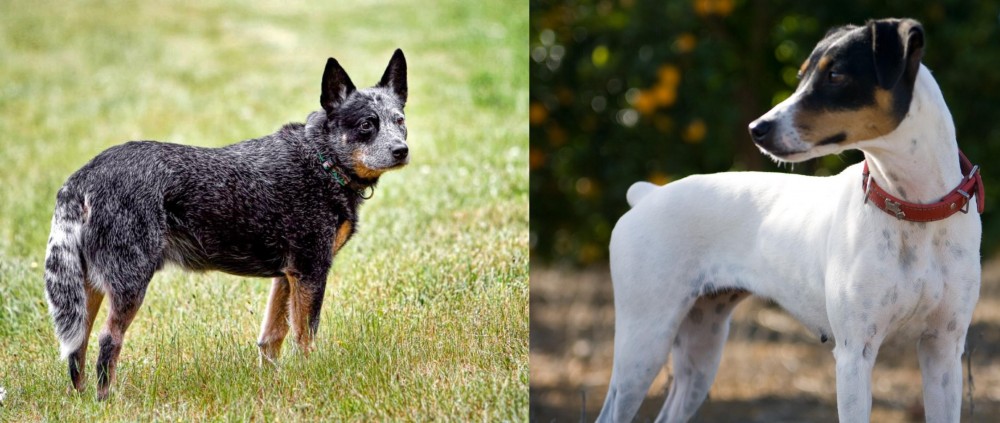 Austrailian Blue Heeler is originated from Australia but Ratonero Bodeguero Andaluz is originated from Spain. Austrailian Blue Heeler may grow 7 cm / 3 inches higher than Ratonero Bodeguero Andaluz. Austrailian Blue Heeler may weigh 7 kg / 16 pounds more than Ratonero Bodeguero Andaluz. Both Austrailian Blue Heeler and Ratonero Bodeguero Andaluz has almost same life span. Both Austrailian Blue Heeler and Ratonero Bodeguero Andaluz has same litter size. Austrailian Blue Heeler requires High Maintenance. But Ratonero Bodeguero Andaluz requires Low Maintenance
Austrailian Blue Heeler is originated from Australia but Ratonero Bodeguero Andaluz is originated from Spain. Austrailian Blue Heeler may grow 7 cm / 3 inches higher than Ratonero Bodeguero Andaluz. Austrailian Blue Heeler may weigh 7 kg / 16 pounds more than Ratonero Bodeguero Andaluz. Both Austrailian Blue Heeler and Ratonero Bodeguero Andaluz has almost same life span. Both Austrailian Blue Heeler and Ratonero Bodeguero Andaluz has same litter size. Austrailian Blue Heeler requires High Maintenance. But Ratonero Bodeguero Andaluz requires Low Maintenance
 In 1840, George Elliott made a match with Australian Dingo and Collie and got a clever and very active dog breed – Australian Blue Heeler. Soon, he showed his good herding instincts and protective nature and got really popular among the cattlemen and ranchers. Soon, as the USA soldiers arrived in Australia, they decided that it will be a great dog to bring home.
In 1840, George Elliott made a match with Australian Dingo and Collie and got a clever and very active dog breed – Australian Blue Heeler. Soon, he showed his good herding instincts and protective nature and got really popular among the cattlemen and ranchers. Soon, as the USA soldiers arrived in Australia, they decided that it will be a great dog to bring home.
Australian Blue Heeler has short, double coat. The coat is water resistant and helps them when the temperature is too high as well. Their coat is rough to the touch, naturally. They can be found in blue or red coat colour mix. The Blue Heeler isn’t actually blue, but their black coat has a bluish tint. Red Heelers have red fur instead of black. They have long tails, strong legs, Dingo-like heads with pointy ears and muscular necks and balanced and athletic bodies.
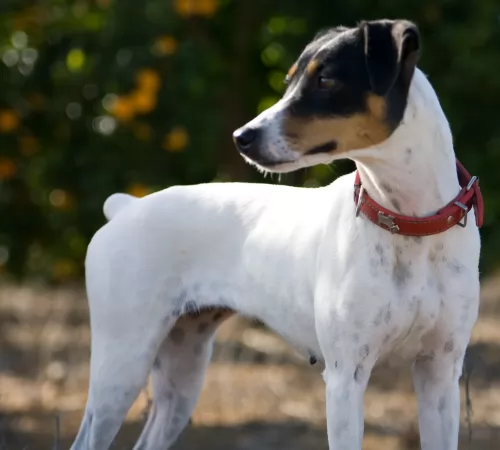 Long ago the English visited Spain to sample their wines, bringing with them smooth coated English Fox Terriers which were later crossed with other dog breeds of the area.
Long ago the English visited Spain to sample their wines, bringing with them smooth coated English Fox Terriers which were later crossed with other dog breeds of the area.
It is believed that the Andalusia Ratter’s ancestors were smooth coated fox terriers. The Club Nacional del Perro Andaluz Ratonero Bodeguero was established and in 1993 a standard for the breed was set.
It is only fairly recently that the breed was recognized by the Royal Canine Society of Spain but it isn’t recognized by any of the major kennel clubs.
 This breed is somehow designed for an outdoor life and outdoor activity. This implies that Blue Heelers have nature made of the high dose of energy. They are always ready to go anywhere you go, and they will be a loyal friend. They are actually very clever, intelligent and ready to help.
This breed is somehow designed for an outdoor life and outdoor activity. This implies that Blue Heelers have nature made of the high dose of energy. They are always ready to go anywhere you go, and they will be a loyal friend. They are actually very clever, intelligent and ready to help.
If you are a type of the person who prefers being indoors and having minimal physical activity, Blue heelers are not the type of a furry companion for you. They have a high daily need for the activity, and they love having lots of space to run and explore. Sometimes, you will realize that having a leash is a must because they will get so playful that they will forget about you!
If you start teaching them to be friendly with other dogs while they are still pups, they will accept that kind of lifestyle. But, if your Blue Heeler is raised as the only dog on the ranch, note that they won’t be very friendly toward other dogs.
Since most of the herd dogs usually respond to only one person, most of the Blue Heelers can follow this old instinct. They can be very independent, as well, and they are usually not the type of the dog that will always be around your leg waiting for a cuddle or ear scratch. But, they build the respect towards humans depending on how they treat him so they can be very lovable and friendly pets.
If you are still confused about their name, you must know that the Blue Heelers can actually lightly nip your heel for attention. They are not aggressive, but they tend to be very protective of the family, humans around them and their property.
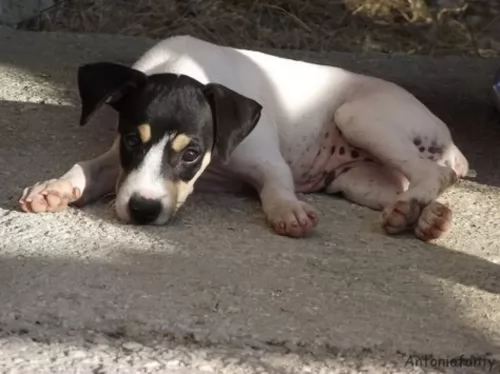 Also known as the Spanish Jack Russell, the Ratonero Bodeguero Andaluz looks very similar to this popular Jack Russell Terrier.
Also known as the Spanish Jack Russell, the Ratonero Bodeguero Andaluz looks very similar to this popular Jack Russell Terrier.
He is a small to medium sized dog with a lean, muscular body. The Ratonero developed in the south of Spain and is thought to be a mix of local ratting dogs and Fox Terriers. This ensured a quick, agile hunter.
The dog stands at between 35 – 43cm in height and weighs 6 - 9kg. The dog’s head is fairly small with dark brown eyes and half erect-half floppy ears. The coat is mainly white with some freckling. It is short and smooth with shades of black and tan covering the facial area. Some of these dogs are born with a natural bob-tail.
These dogs are known to have robust, hearty, happy personalities, full of the joys of living. They get on well with children as well as other pets if they have grown up with them.
Introductions should be slow if one of these dogs are brought into a home where there are already other pets. He is a very active breed and will be requiring plenty of mental stimulation and physical exercise.
They can provide quite a bit of entertainment for their human families as they can become quite clownish. They’re the kind of dogs that can adapt to life in the countryside or the city.
 They are generally good with children, but you must be aware of their inherent desire to herd. Always supervise when your Blue Heeler is around small children.
They are generally good with children, but you must be aware of their inherent desire to herd. Always supervise when your Blue Heeler is around small children.
Ball tricks, frisbee fun, running companion, herding cattle.
It is best to buy a puppy. These dogs get attached to one human and to the territory.
They are generally quick learners. If you teach them to be playful, friendly and loving, they will learn it in no time. So be aware of the decisions that can cost you when the dog grows up.
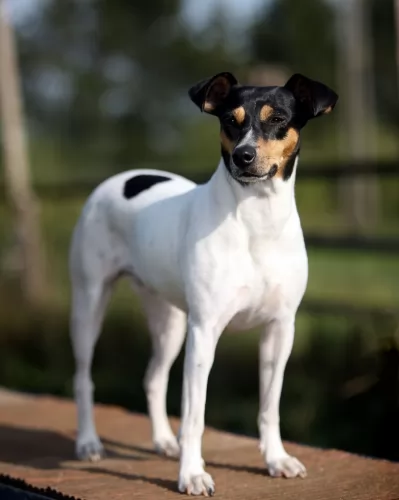 Your Ratonero Bodeguero Andaluz to this day is a ratter, always alert and ready to spring on prey. He is always lively and friendly, and with his loving nature, makes a splendid companion for his human family.
Your Ratonero Bodeguero Andaluz to this day is a ratter, always alert and ready to spring on prey. He is always lively and friendly, and with his loving nature, makes a splendid companion for his human family.
He is also a stubborn dog, liking to go his own way, and therefore will require training and socialization. He is an adaptable little dog too and when you bring him into your home he is willing to adapt to your way of life and become a loyal and loving member of your family.
 Progressive Retinal Atrophy usually causes slow and painless loss of sight. This process takes years, but there are cases where this disease took only months before the dog ended up completely blind.
It is advisable to take your Blue Heeler to the vet for a test that can tell you if your dog is carrying the gene for this disease.
Progressive Retinal Atrophy usually causes slow and painless loss of sight. This process takes years, but there are cases where this disease took only months before the dog ended up completely blind.
It is advisable to take your Blue Heeler to the vet for a test that can tell you if your dog is carrying the gene for this disease.
Lens luxation is a disease where the lens of dog’s eye separates partially or completely. Good news is that this disease can be treated.
Most common is the hip or elbow dysplasia. This is the disease where hip joints do not develop properly and begin to grind. This condition can sometimes be treated with physiotherapy, but there is a chance that your Blue Heeler will need a surgery. If you have a habit of regular vet checks and keeping your dog slim and fed with quality food, you can a make a big difference.
Osteochondritis Dissecans (OCD) causes the dog to have excess cartilage and deficient bone, where cartilage does not get replaced by bone during fetal development. This disease usually requires surgery and prescribed medicines.
Congenital hereditary sensorineural deafness – CHSD is a common form of deafness.
Bilateral deafness can be identified when the dog is still a puppy, more-less at six weeks of age. A puppy with deafness in only one ear is harder to identify, but it can happen.
Portosystemic shunt means that the blood flow is getting back into the bloodstream instead of passing through the liver. That means that liver can’t clear out the toxins, and the organ itself fails to grow properly. This inherited type of shunt can be treated with surgery if the diagnose is set on time.
 With good care, your Andalusian Ratter isn’t likely to get sick, but still, you would be better off knowing about some of the common dog diseases your pet could get.
With good care, your Andalusian Ratter isn’t likely to get sick, but still, you would be better off knowing about some of the common dog diseases your pet could get.
This is usually seen in young dogs where there is lameness in the hind legs and hip pain. It is believed that Legge Perthe’s occurs because of a genetic predisposition, and when it develops, there is sadly no cure.
Skin infections may seem fairly mild but nothing can be further from the truth. They can be painful and frustrating. Skin redness, dryness, itchiness and pain can cause your pet to lick and bite and make the situation worse. If your pet is being driven crazy by a skin irritation, get him to the vet who will do a complete physical examination.
Other diseases to be aware of include hip dysplasia, obesity, epilepsy and bloat.
 Choose a dog food that will provide nutrients that will help in the bone developing. Since they are more likely to suffer from joint diseases, you must take this advice seriously. It would be great if you speak about this with your vet before you choose food on your own.
Choose a dog food that will provide nutrients that will help in the bone developing. Since they are more likely to suffer from joint diseases, you must take this advice seriously. It would be great if you speak about this with your vet before you choose food on your own.
The best food for Blue Heeler is a high-quality food which supplies them with premium nutrition to fuel their activity.
They also drink a lot of water, so be sure that they always have a fresh water available.
Lots and lots of the outdoor activity and a quality food. You must be very cautious because this kind of dogs gets overweight easily because they just love the treats and extra food portion.
Any outdoor activity that is mentally challenging and interesting enough to keep them from running in the field trying to catch anything that moves.
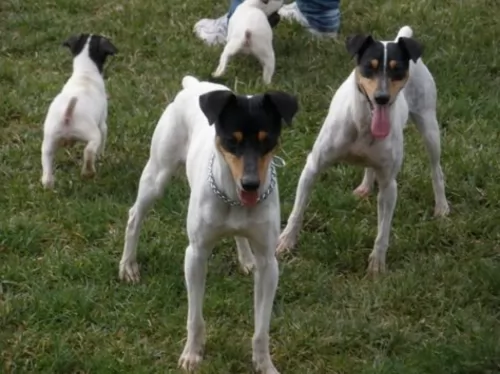 This is a fairly low maintenance dog as the short smooth coat will be easy to brush twice a week.
This is a fairly low maintenance dog as the short smooth coat will be easy to brush twice a week.
Check him over for unusual lumps, trim his nails and check inside his ears, look into his eyes to ensure they are bright and alert and look inside his mouth to make sure he doesn’t have any rotten teeth.
Have your pet neutered or spayed if you want to avoid puppies. This can be beneficial for your pet’s health too.
Feed your Ratonero Bodeguero Andaluz only the best food there is. If you opt for commercially manufactured food, make sure its full of vitamins and minerals. Your little pet will want consistency and simplicity with his food to avoid digestive problems.
Try and provide him with some home-made food which can be added to the dry kibble twice a week as a treat. Boiled chicken, brown rice or pasta and spinach, sweet potatoes and carrots all chopped up ad mixed into the dry kibble will ensure your pet’s health.
Some raw meat added in occasionally will also go towards ensuring his good health.
Always make sure he has access to fresh, cool water.
Provide him with a safe, dry, warm, comfortable place to sleep.
Get him to the vet when you see he is sick.
Ensure he has sun and shade in the garden.
Never ever leave him in a hot car.